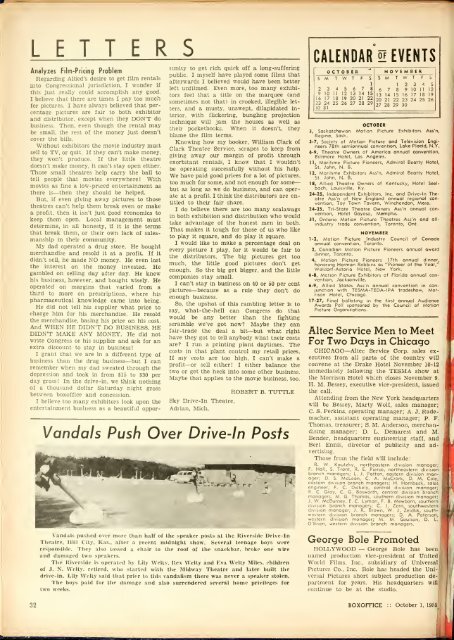Boxoffice-October.01.1955
Create successful ePaper yourself
Turn your PDF publications into a flip-book with our unique Google optimized e-Paper software.
LETTERS<br />
Analyzes Film-Pricing Problem<br />
Regarding AUied's desire to get film rentals<br />
into Congressional jurisdiction, I wonder if<br />
this just really could accomplish any good.<br />
I believe that there are times I pay too much<br />
for pictures. I have always believed that percentage<br />
pictures are fair to both exhibitor<br />
and distributor, except when they DON'T do<br />
business. Then, even though the rental may<br />
be small, the rest of the money just doesn't<br />
cover the bills.<br />
Without exhibitors the movie industry must<br />
sell to TV, or quit. If they can't make money,<br />
they won't produce. If the little theatre<br />
doesn't make money, it can't stay open either.<br />
Those small theatres help carry the ball to<br />
tell people that movies everywhere! With<br />
movies as fine a low-priced entertainment as<br />
there Is—then they should be helped.<br />
But, if even giving away pictures to those<br />
theatres can't help them break even or make<br />
a profit, then it isn't just good economics to<br />
keep them open. Local management must<br />
determine, in all honesty, if it is the terms<br />
that break them, or their own lack of salesmanship<br />
in their community.<br />
My dad operated a drug store. He bought<br />
merchandise and resold it at a profit. If it<br />
didn't sell, he made NO money. He even lost<br />
the interest on the money invested. He<br />
gambled on selling day after day. He knew<br />
his business, however, and bought wisely. He<br />
operated on margins that varied from a<br />
third to more on prescriptions, where his<br />
pharmaceutical knowledge came Into being.<br />
He did not tell his supplier what price to<br />
charge him for his merchandise. He resold<br />
the merchandise, basing his price on his cost.<br />
And WHEN HE DIDN'T DO BUSINESS, HE<br />
DIDN'T MAKE ANY MONEY. He did not<br />
write Congress or his supplier and ask for an<br />
extra discount to stay in business!<br />
I grant that we are in a different type of<br />
business than the drug busines.s—but I can<br />
remember when my dad sweated through the<br />
depression and took in from $15 to $30 per<br />
day gross! In the drive-in, we think nothing<br />
of a thousand dollar Saturday night gross<br />
between boxoffice and concession.<br />
I believe too many exhibitors look upon the<br />
entertainment business as a beautiful opportunity<br />
to get rich quick off a long-suffering<br />
public. I myself have played some films that<br />
afterwards I believed would have been better<br />
left unfilmed. Even more, too many exhibitors<br />
feel that a title on the marquee (and<br />
sometimes not thati in crooked, illegible letters,<br />
and a musty, unswept, dilapidated interior,<br />
with flickering, bungUng projection<br />
technique wUl jam the houses as well as<br />
their pocketbooks. When it doesn't, they<br />
blame the film terms.<br />
Knowing how my booker, William Clark of<br />
Clark Theatre Service, scrapes to keep from<br />
giving away our margin of profit through<br />
exorbitant rentals, I know that I wouldn't<br />
be operating successfully without his help.<br />
We have paid good prices for a lot of pictures,<br />
too much for some, and not enough for some<br />
but as long as we do business, and can operate<br />
at a profit. I think the distributors are entitled<br />
to their fair share.<br />
I do believe there are too many scalawags<br />
in both exhibition and distribution who would<br />
take advantage of the honest men in both.<br />
That makes it tough for those of us who like<br />
to play it square, and do play it square.<br />
I would like to make a percentage deal on<br />
every picture I play, for it would be fair to<br />
the distributors. The big pictures get too<br />
much, the little good pictures don't get<br />
enough. So the big get bigger, and the little<br />
companies stay small.<br />
I can't stay in business on 40 or 50 per cent<br />
pictures—because as a rule they don't do<br />
enough business.<br />
So, the upshot of this rambling letter is to<br />
say, what-the-hell can Congress do that<br />
would be any better than the fighting<br />
scramble we've got now? Maybe they can<br />
fair-trade the deal a bit—but what right<br />
have they got to tell anybody what tneir costs<br />
are? I run a printing plant daytimes. The<br />
costs in that plant control my retail prices.<br />
If my costs are too high, I can't make a<br />
profit—or sell either! I either balance the<br />
two or get the heck into some other business.<br />
Maybe that applies to the movie business, too.<br />
Sky Drive-In Theatre,<br />
Adrian, Mich.<br />
ROBERT B. TUTTLE<br />
CALENDAR Of EVENTS<br />
OCTOBER<br />
Vandals Push Over Drive-ln Posts<br />
Vandals pushed over more than half of the speaker posts at the Riverside Drive-In<br />
Theatre, Hill City, Kas., after a recent midnight show. Several teenage boys were<br />
responsible. They also tos.scd a chair to the roof of the snackbar, broke one wire<br />
and damaged two speakers.<br />
The Kivcrsldc is operated by Lily Welty, Rex Welty and Eva Wclty Miles, children<br />
of J. N. Welty, retired, who started with the Midway Theatre and later built the<br />
drivc-ln. Lily Welty said that prior to this vandalism there was never a speaker stolen.<br />
The boys paid for the damage and also surrendered several home privileges for<br />
two weeks.

















